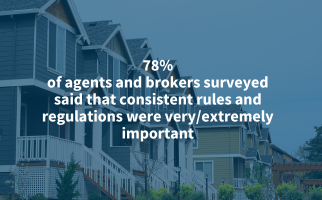Real estate agents and brokers are no strangers to the challenges posed by multiple listing service (MLS) systems operating across different regions. This was highlighted in recent results from the WAV Group Customer Experience Index survey, which revealed agents’ and brokers’ desire for consistency in rules and regulations across all MLS systems statewide.
Of real estate professionals who responded to the Customer Experience Index survey, 84% rated the sharing of listing data across all markets as very or extremely important. This is unsurprising, as, seamless access to comprehensive listing information facilitates smoother transactions and enhances client satisfaction. But what interested WAV Group was what respondents considered the next most important item — 78% of those surveyed said that consistent rules and regulations mattered.
 Why is consistency in rules and regulations so crucial for real estate agents and brokers navigating the statewide MLS landscape? Let’s delve into a couple of key reasons:
Why is consistency in rules and regulations so crucial for real estate agents and brokers navigating the statewide MLS landscape? Let’s delve into a couple of key reasons:
- Clarity and Transparency:
Consistent rules and regulations provide a clear framework within which agents and brokers can operate. When everyone adheres to the same set of guidelines, there is less room for confusion or misinterpretation. This clarity fosters transparency in transactions, instilling trust among stakeholders and reducing the likelihood of disputes or legal complications.
- Streamlined Processes:
Operating under disparate sets of rules and regulations can lead to inefficiencies and delays. Agents may find themselves grappling with divergent requirements when listing properties or managing transactions across different MLS systems. By harmonizing these regulations statewide, redundant tasks can be minimized and processes streamlined. This not only saves time and resources, but also enhances overall productivity in the real estate ecosystem.
Moreover, consistent rules and regulations contribute to a level playing field for all participants in the market. Whether an agent is based in a metropolitan area or a rural community, they can expect a uniform set of standards governing their professional conduct and interactions within the MLS framework. This fosters a sense of fairness and equal opportunity, bolstering confidence in the integrity of the real estate industry.
In advocating for consistent rules and regulations in statewide MLS collaboration, real estate professionals don’t merely seek uniformity for the sake of convenience. Rather, they recognize the profound impact that cohesive governance can have on the efficiency, transparency, and integrity of the market. By prioritizing this aspect of MLS operation, stakeholders not only advance their own interests but also contribute to a more robust and resilient real estate ecosystem as a whole.




